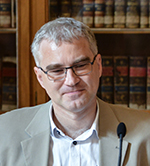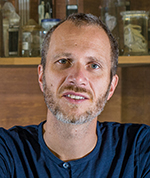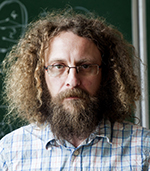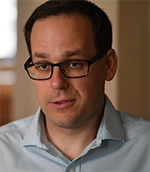Attracting ERC grants – spotlight on Charles University Prague

You worked as an ERC grant application evaluator from its beginning. Can you share any memories of the early days?
Over time, my emotions concerning the ERC have gone from afraid to happy to impressed. When I initially received the request to act as an evaluator for ERC grant applications I asked myself if I was able to do this, I was a little concerned that I was not up to the job. But I had previously had training in evaluation while working in the USA, and this gave me the confidence during my first days in the role.
To my relief, what I found was that the ERC has the best evaluation system I have experienced. It works to find ideas that go against mainstream thought, original proposals with the vision to reveal hidden gems. What I really liked about the ERC was that it was not bureaucratic, it really went after the principles rather than box ticking. Differences of opinion between evaluators were explored. As a result the work was interesting, intensive and occasionally even exhausting! I found that the ERC learns from experience, and over time the Scientific Council made some adjustment to rules and policies as a result of issues encountered in the initial evaluation rounds.
For those Maths and Computer Science researchers that were successful in securing ERC grants, it can be difficult to explain their highly technical research results to the public. Can you recommend any particular approaches?
Mathematics and the theoretical part of computer science often involve a high level of abstraction and require heavy mathematical technology. It’s best to avoid concentrating on explaining the technology but instead describing the basic question and the answer provided by the research. I really believe that any research that is genuinely strong - a real breakthrough ¬- should be possible to communicate in this way. The terminology may need simplification or analogy to make it accessible, and some effort is definitely needed but it is well worth it. And it’s not impossible - there are even awards based on this premise, for example the George Pólya Prize for Mathematical Exposition. Part of our job in communicating about our research should be to replace the common “fear” of mathematics, particularly in the education process, by an appreciation of its beauty and usefulness.
You were educated both in maths and computer science. How does the ERC deal with interdisciplinary research that would arise from this, or other mixes of fields?
I believe the ERC sees interdisciplinarity in the true sense of the word. It does not apply the term to projects that merely use the tools of one discipline to perform research in the other, but reserves it for projects which make a significant advancement in both research areas concerned. This is the most difficult path to tread, and is also difficult to evaluate, but such projects are also frequently the most rewarding.
Did your experiences as an ERC evaluator influence the development of your current role at Charles University? What is the secret to Charles University's success in attracting ERC grants?
While working as an ERC evaluator I realised that the Czech Republic was not performing spectacularly in its calls. One major obstacle was the lack of experience amongst young researchers - experience both of working independently and also of working abroad. A step in the right direction was to offer individual fellowships to interested researchers which helped create a support system for ERC grant applicants. The Vice-Rector of Charles University responsible for science, Jan Konvalinka, suggested such a grant system (called the Primus Research Programme). It supports young researchers of any nationality who are trying to establish independent careers and also their own research groups. Charles University proved willing to look beyond the three to five years it can take researchers to build a strong case.
We also encouraged young Czech researchers to gain substantial experience abroad during or even after their PHD studies, and spoke about ERC grants to those returning home. It was really a long term plan. Together with the ERC national contact point Petra Fedorova, we created a system of workshops for potential applicants to test out their research ideas, examine successful projects and even put themselves in the place of the ERC evaluators via mock evaluation exercises. Other researchers who also had previous experience as ERC applicants, grantees and evaluators (but are currently inactive in this capacity) are also of significant help.
What advice would you give to research centres in countries that have not yet received many ERC grants, for example those countries that more recently joined the EU?
For our country, as well as for some others, it is about three decades since major change happened at university and research institute level. Therefore the organization of science can still sometimes be not quite as efficient as in other countries. So I would say the most important thing to win ERC grants is to be willing to challenge the status quo and be open to new initiatives.
Talented young researchers need to be welcomed, their independence also needs to be welcomed and they need to be supported. The research environment must be open to embrace and support changes - and ERC projects can introduce big changes!
The other thing is to systematically work in advance, perhaps years in advance, to gain the interest of potential applicants, even looking at promising PHD students. Also, retaining and supporting the best researchers is key. If the environment doesn’t change, then the researchers won’t stay, or they can lose their motivation and give up on their original project.
As for the ERC itself, I think the feedback given to applicants who are not initially successful is of primary importance. It should always be careful to provide constructive criticism, which can be accepted as a fair judgement by the applicants. This will encourage reapplications and also give researches a nudge in the right direction.
You have said in the past (in Czech): "(The ERC) is not about creating a club driven by the chosen ERC grant recipients at the expense of others, but rather at promoting the best ideas for the benefit of all." Can you explain more?
I believe it’s a vocation to work in the scientific domain and that scientists should work to serve society in the broadest sense. The ERC is a unique construct that tries to identify the best research leaders with the most original projects. Its grants are not given to researchers looking for superficial success but rather those willing to take a risk in order to potentially create something with value possibly far beyond any easily measurable or short term economic impact. For me, the ERC promotes research leadership as a form of service - this is also my motivation for supporting the ERC.

|
From 2008 Zdeněk Strakoš served three terms as a member of the ERC Advanced Grant evaluation panel for Computer Science and Informatics (PE6), and one additional term as the Chair of this panel. He now serves as the Coordinator of support for prospective ERC applicants at Charles University. His research interests concern computational mathematics and scientific computing. His publications often challenge mainstream views and present broad perspectives (mathematical and computer science, analytic and computational, historical and the most contemporary). |
Current ERC grantees at Charles University:
| First name | Last name | Acronym | Project full name | Call | € Million | Grantees |
| Michal | Koucky | LBCAD | Lower bounds for combinatorial algorithms and dynamic problems | 2013-CoG | 0.9 |
|
| Jana | Kalbacova Vejpravova | TSuNAMI | Trans-Spin NanoArchitectures: from birth to functionalities in magnetic field | 2016-STG | 1.5 | picture |
| Jiri | Klimes | APES | Accuracy and precision for molecular solids | 2017-STG | 0.9 | picture |
| Vladimir | Hampl | Amitochondriates | Life without mitochondrion | 2017-COG | 1.9 |
|
| Libor | Barto | CoCoSym | Symmetry in Computational Complexity | 2017-COG | 1.2 |
|
| Matyas | Fendrych | CELLONGATE | Unraveling the molecular network that drives cell growth in plants | 2018-STG | 1.5 |
|
| Ondrej | Pejcha | Cat-In-hAT | Catastrophic Interactions of Binary Stars and the Associated Transients | 2018-STG | 1.2 |
|





